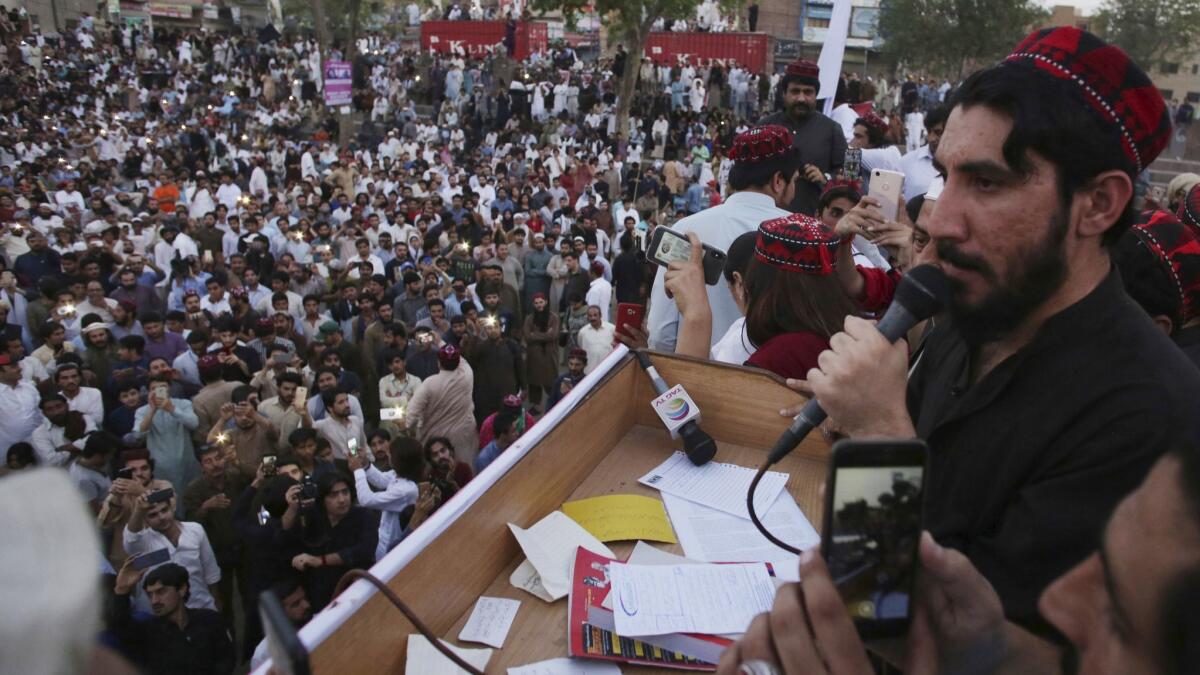Pakistan arrests Pashtun rights leader critical of military

- Share via
PESHAWAR, Pakistan — Pakistani authorities on Monday arrested a young and charismatic rights activist from the Pashtun community, the nation’s largest minority group, who has been a thorn in the government’s side because of his repeated critiques of brutality, censorship and extrajudicial killings.
The activist, Manzoor Ahmad Pashteen, leads the Pashtun Protection Movement, widely known as PTM. For the last two years, the movement has leveled fierce criticisms against the country’s powerful police and military.
Pashteen was arrested in the northern provincial capital of Peshawar on charges of sedition and hate speech against the army. A magistrate authorized his detention, in Peshawar Central Prison, for 14 days on a judicial remand. Four of Pashteen’s supporters were also detained.
The alleged offense is that Pashteen declared in a televised program on Jan. 21 that he did not accept the Pakistani Constitution because it denied fundamental rights to minorities. Authorities also accused him of fomenting ethnic divisions in Pakistan and using derogatory language against the state.
Human rights advocates immediately criticized the arrest, saying the government was misusing laws banning sedition, conspiracy, hate speech and intimidation to stifle legitimate dissent.
“Using criminal laws to chill free expression and political opposition has no place in a democracy,” said Brad Adams, Asia director at Human Rights Watch. “The Pakistan government should find ways of resolving political disagreements with dialogue rather than intimidation. Peaceful dissent is the essence of democracy and should not be treated as sedition.”
The PTM represents Pashtuns in the often-dangerous region previously known as the Federally Administered Tribal Areas, which borders Afghanistan.
The tribal areas were governed by early 20th century regulations — dating to the era of British imperial rule — that allowed collective punishment for communities, including property destruction and denial of access to courts. In recent years, the region has come under attacks by the Taliban, government military offensives and U.S. drone strikes. In May 2018, Pakistan’s parliament passed a constitutional amendment merging the tribal areas with the province of Khyber Pakhtunkhwa — of which Peshawar is the capital — and extending constitutional protections to the former tribal areas.
Asserting the constitutional rights of Pashtun people, the movement has organized protests against the government to demand accountability for extrajudicial killings, enforced disappearances and casualties from land mines. The authorities have cracked down on Pashteen’s followers, using arbitrary arrests and intimidation as instruments of coercion.
The PTM has also called for police and military officers who have abused human rights to be held accountable, possibly through a truth and reconciliation process.
Addressing reporters, Pashteen protested his innocence.
“We are struggling for our constitutional rights and that is not acceptable to certain quarters,” he said. “We have trust in the court, provided no one interferes in its functioning.”
Mohsin Dawar, a senior leader of PTM and member of parliament, said: “This is our punishment for demanding our rights in a peaceful and democratic manner. Manzoor’s arrest will only strengthen our resolve. We demand the immediate release of Manzoor Pashteen.”
At a news conference in Islamabad, Pakistan’s capital, Dawar called Pashteen’s arrest an “abduction.”
Amnesty International also called for Pashteen’s “immediate and unconditional” release.
The group said on Twitter: “Manzoor Pashteen has been arbitrarily detained for exercising his human rights to freedom of expression and peaceful assembly. He must be released immediately and unconditionally.”
More to Read
Sign up for Essential California
The most important California stories and recommendations in your inbox every morning.
You may occasionally receive promotional content from the Los Angeles Times.










